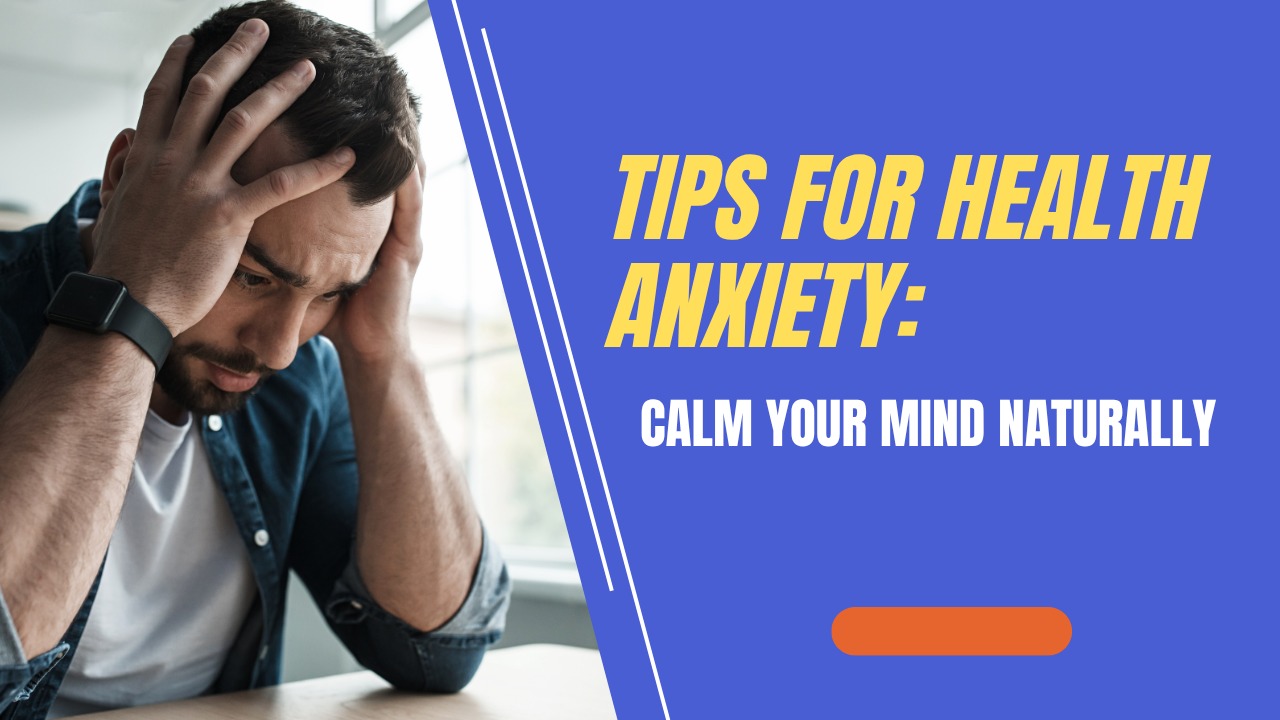Healthy coping with health anxiety starts by understanding that occasional worry is normal—but constant fear can be draining. In today’s fast-paced world, many people misinterpret minor symptoms as signs of serious illness, leading to ongoing stress and panic. This condition, known as health anxiety, can interfere with daily life and emotional well-being.
People with health anxiety often find themselves obsessively checking symptoms, Googling illnesses, or seeking frequent reassurance. While these behaviors may feel helpful in the moment, they usually reinforce the anxiety cycle. Recognizing these patterns is the first step toward healing and peace of mind.
Some effective tips for health anxiety include limiting internet symptom searches, practicing deep breathing and mindfulness, staying physically active, and talking to a therapist. Building a calm, consistent routine and focusing on facts over fears can help reduce anxiety and promote a healthier, more balanced mindset.
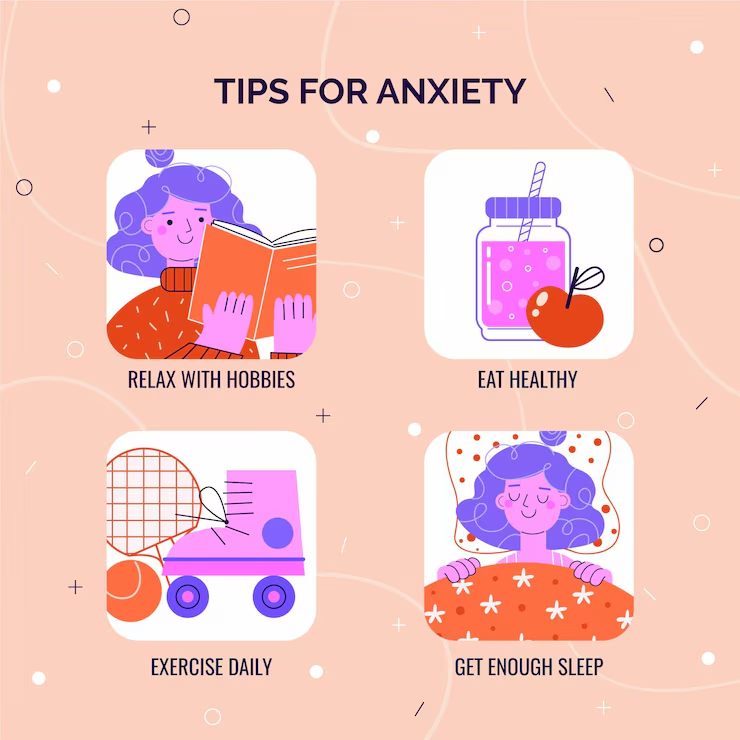
What is Health Anxiety ?
Health anxiety (formerly known as hypochondria or hypochondriasis) is a persistent and excessive worry about having a serious illness, despite little or no medical evidence to support it. This condition is recognized in the DSM-5 as a somatic symptom and related disorder, meaning that the anxiety focuses on bodily symptoms and physical health concerns.
People with health anxiety often misinterpret normal bodily sensations—such as a headache, muscle twitch, or rapid heartbeat—as signs of a severe medical condition. This leads to frequent doctor visits, constant self-checking, and compulsive searching of symptoms online. These behaviors usually increase anxiety over time rather than relieve it.
Some effective tips for health anxiety include setting boundaries around internet research, using mindfulness techniques to reduce overthinking, focusing on evidence rather than fear, and seeking therapy when needed. With the right support and coping strategies, it is possible to break the cycle of worry and restore emotional balance.
Why Does Health Anxiety Form ?
Health anxiety often forms due to a combination of personal experiences, thought patterns, and environmental influences. It can be triggered by a past illness, witnessing a loved one’s health scare, or exposure to alarming medical information. These events can create a lasting fear that minor symptoms are signs of serious illness.
Cognitive distortions—like catastrophizing or assuming the worst—also play a major role. When individuals misinterpret normal bodily sensations as dangerous, they become trapped in a cycle of worry, self-monitoring, and reassurance-seeking. This constant focus on health can make the anxiety feel even more real and urgent.
To manage this condition, it’s important to learn helpful tips for health anxiety such as limiting symptom-checking, practicing mindfulness, and reframing negative thoughts. Therapy, particularly cognitive-behavioral therapy (CBT), can also be very effective. Understanding the root causes of health anxiety is the first step toward breaking the cycle and restoring emotional peace.
Health anxiety often begins in adolescence or early adulthood and can develop for several reasons:
Past medical trauma: A serious illness in childhood or witnessing someone else suffer.
Overexposure to health information: Especially from online searches or media.
Anxious personality or genetic predisposition
Family environment: Growing up in a household where health worries were common.
When and How Does Health Anxiety Appear ?
Health anxiety can appear at any stage of life, though it often begins in early adulthood or after a major health-related event. For some, it may develop after recovering from an illness or seeing a loved one go through a medical crisis. Others may experience it during periods of high stress or major life transitions when their sense of control feels threatened.
The onset is usually gradual. A person might notice a physical symptom—like a headache or stomach discomfort—and begin to worry excessively about what it could mean. Instead of finding reassurance from medical check-ups or tests, the anxiety often intensifies, leading to more checking, researching, and self-monitoring.
Health anxiety can also be triggered by frequent exposure to health-related content, such as news stories or social media posts about diseases. This constant input can feed fear and keep the mind focused on worst-case scenarios.
Helpful tips for health anxiety include recognizing triggers, limiting media consumption, focusing on facts over fear, and practicing grounding exercises. With time and support, it’s possible to regain peace and stop the worry cycle.
Health anxiety tends to manifest in cycles and is often triggered by:
Minor bodily sensations (e.g., headache, fatigue, chest pain)
Exposure to illness-related news or stories
Personal or family medical experiences
The anxiety may lead to compulsive behaviors such as frequent Googling symptoms, doctor shopping, body-checking, and avoiding health-related conversations.
Symptoms of Health Anxiety
Persistent fear of having a serious illness
Repeated medical checkups with no reassurance
Difficulty functioning in daily life due to worry
Physical symptoms like dizziness, stomach pain (caused by anxiety)
Avoidance of hospitals or anything health-related (or conversely, overchecking)
Top Effective Tips for Managing Health Anxiety
Here are eight powerful, science-backed, and practical tips for overcoming health anxiety, along with benefits and what you need to apply them.
Cognitive Behavioral Therapy (CBT): Rewire Your Thoughts
Cognitive Behavioral Therapy (CBT) is one of the most effective treatments for managing health anxiety. It focuses on identifying and challenging the negative thought patterns that fuel excessive worry about health. By learning how to reframe distorted thinking, individuals can begin to separate real health concerns from imagined threats.
CBT helps people understand how their thoughts, feelings, and behaviors are connected. For example, noticing a mild symptom like a sore throat might trigger a fear of a serious illness. CBT teaches you to pause, evaluate the evidence, and choose a more balanced response. This approach gradually reduces the intensity and frequency of anxious thoughts.
One of the most recommended tips for health anxiety is to try CBT with a trained therapist. It can also be practiced through self-help books or digital tools. Over time, CBT empowers individuals to gain control over their fears, leading to a calmer and more rational mindset.
What it is: CBT is a form of talk therapy that helps you identify and change distorted thinking patterns and behaviors.
How it helps: It teaches you how to challenge irrational fears about your health, reduce obsessive thoughts, and adopt healthier coping strategies.
Ingredients:
A licensed CBT therapist
Journaling thoughts and feelings
Worksheets or CBT apps (e.g., Woebot, MindShift)
Benefits:
Long-term improvement
Helps break the cycle of worry
Empowers self-awareness and emotional regulation
Mindfulness and Meditation: Ground Yourself in the Present
Mindfulness and meditation are powerful tools for managing health anxiety by helping you stay grounded in the present moment. When you’re constantly worrying about future illnesses or interpreting harmless symptoms as threats, mindfulness teaches you to observe those thoughts without judgment or fear.
Through regular meditation, deep breathing, or body scans, you can calm your nervous system and reduce the urge to check symptoms or seek reassurance. These practices help shift your focus from “what if” scenarios to “what is,” allowing space for clarity and emotional balance. Even just 10 minutes a day can make a meaningful difference.
Among the most effective tips for health anxiety, incorporating mindfulness into your daily routine stands out. It trains your mind to respond rather than react, easing the mental spiral of health-related fears. With consistency, mindfulness creates a stronger sense of control and peace, allowing you to live more fully in the moment.
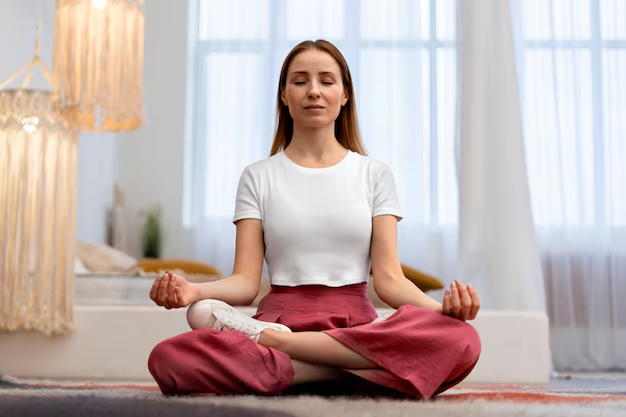
What it is: Mindfulness involves staying present and fully engaged in the moment without judgment.
How it helps: Anxiety is often future-focused (“What if I get sick?”). Mindfulness pulls you back into the present, where you’re safe.
Ingredients:
Meditation apps like Headspace, Insight Timer, or Calm
A quiet space and comfortable posture
Daily 10–15 minutes of practice
Benefits:
Reduces racing thoughts
Lowers cortisol (stress hormone)
Improves emotional resilience
Limit Health-Related Googling (Cyberchondria Management)
Limiting health-related Googling is crucial for managing health anxiety and avoiding a condition often called cyberchondria. While the internet offers vast medical information, it can quickly become a source of fear and confusion. A simple search for a mild symptom can lead to overwhelming results, often pointing to rare or serious illnesses.
This constant checking fuels the cycle of anxiety. The more you search, the more you worry, and the harder it becomes to trust real medical advice. Recognizing that online information is not tailored to your personal health and can lack context is key to breaking this pattern.
One of the most effective tips for health anxiety is to set boundaries on Googling symptoms. Try replacing the urge with calming activities like deep breathing, journaling, or going for a walk. Reducing screen time and relying on healthcare professionals for guidance can help restore peace of mind and build healthier habits.
What it is: Cyberchondria is the escalation of health anxiety from online searches.
How it helps: Reducing or stopping the compulsive need to search for symptoms online cuts off a major source of anxiety.
Ingredients:
Internet use timers or blockers (e.g., Cold Turkey)
Accountability partner (friend or therapist)
A journal to write thoughts instead of Googling
Benefits:
Reduces false assumptions
Cuts down on panic and obsessive thoughts
Builds trust in medical professionals and your own body
Establish a ‘Worry Time’ Routine
Establishing a ‘worry time’ routine is a simple yet effective strategy for managing health anxiety. Instead of trying to suppress anxious thoughts throughout the day, set aside a specific time—around 15–20 minutes daily—dedicated solely to acknowledging and processing your worries. This structured approach helps you gain control over your thoughts rather than letting them control you.
During this time, write down your health-related fears, evaluate them logically, and practice calming techniques like deep breathing or journaling. Once the time is up, gently redirect your focus to other activities. This method teaches your brain that worry has a time and place, reducing intrusive thoughts throughout the day.
Among the most practical tips for health anxiety, creating a worry time routine allows you to contain anxiety and prevent it from disrupting your entire day. Over time, it helps you manage obsessive thinking, reduce emotional overwhelm, and build a healthier relationship with uncertainty.
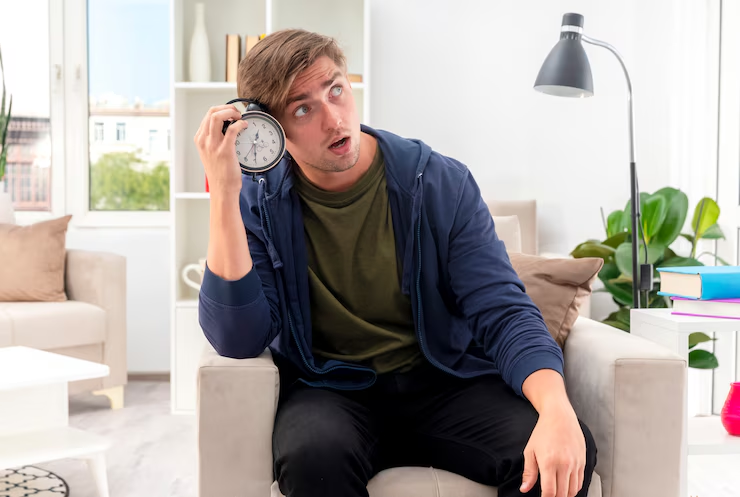
What it is: Designate a specific 10-15 minute daily slot to acknowledge and write down your health worries.
How it helps: This method contains anxiety to a controlled time period, preventing it from taking over your day.
Ingredients:
Notebook or digital journaling app
Set time and place (preferably not near bedtime)
Timer or alarm
Benefits:
Less intrusive health anxiety throughout the day
Greater self-awareness of repetitive thoughts
Encourages emotional processing without suppression
Practice Exposure Therapy Gradually
Practicing exposure therapy gradually is a proven method to reduce health anxiety by facing fears in a controlled, step-by-step way. Instead of avoiding triggers—like doctor visits, reading health articles, or thinking about illness—exposure therapy encourages you to face them gently and repeatedly until the anxiety lessens.
Start small. For example, if checking your pulse causes anxiety, try doing it once without responding with fear or reassurance. Over time, gradually increase your exposure to other triggers, such as reading about common symptoms without spiraling into panic. This helps your brain learn that these situations aren’t truly dangerous and don’t need to be avoided.
Among the most powerful tips for health anxiety, gradual exposure therapy helps retrain your brain to tolerate uncertainty and discomfort. Working with a therapist can enhance the process, but even self-guided exposure can lead to lasting changes in how you respond to health-related fears, creating more freedom and peace.
What it is: A behavioral technique that involves slowly exposing yourself to anxiety triggers (like hospitals or health news) in a safe way.
How it helps: Avoidance keeps fear alive. Gradual exposure reduces fear through desensitization.
Ingredients:
Support from a therapist
A trigger hierarchy list (least to most scary)
Relaxation techniques during exposure
Benefits:
Builds courage and confidence
Dismantles avoidance patterns
Long-lasting reduction in anxiety
Maintain a Balanced Lifestyle (Body-Mind Connection)
Maintaining a balanced lifestyle is key to managing health anxiety, as it strengthens the body-mind connection and promotes overall well-being. A healthy routine that includes proper sleep, regular exercise, nutritious meals, and relaxation techniques can significantly reduce physical symptoms that may otherwise trigger anxious thoughts.
When your body is well-cared for, your mind feels more stable and resilient. Regular physical activity helps regulate mood and decrease stress hormones, while quality sleep improves emotional regulation. Eating a balanced diet supports brain health and prevents energy crashes that can mimic anxiety symptoms. These habits create a strong foundation for mental clarity and calm.
Among the most essential tips for health anxiety, maintaining a balanced lifestyle helps prevent overreactions to normal bodily sensations. When your daily life includes movement, rest, and nourishment, it becomes easier to manage fear, focus on the present, and feel in control of your health and emotions.

What it is: A healthy lifestyle boosts physical and mental well-being.
How it helps: Sleep deprivation, poor diet, and lack of movement can mimic illness and amplify anxiety.
Ingredients:
Regular exercise (30 mins/day)
Nutritious diet (focus on whole foods)
Quality sleep (7–9 hours per night)
Benefits:
Reduces false bodily symptoms caused by stress
Improves serotonin and dopamine levels
Enhances emotional resilience
Seek Reassurance Responsibly (Limit Reassurance-Seeking)
Seeking reassurance responsibly is crucial when managing health anxiety. While it’s natural to want comfort or confirmation from doctors, friends, or family, excessive reassurance-seeking can actually reinforce anxiety. The temporary relief it provides often leads to a stronger need for validation next time a symptom arises, keeping the worry cycle going.
Learning to limit how often you ask for reassurance can help build emotional resilience. Instead of immediately texting a friend or Googling symptoms, pause and ask yourself if your worry is based on facts or fear. Remind yourself of previous times when similar concerns turned out to be harmless. Trusting your body and previous medical evaluations is a key part of growth.
Among the most helpful tips for health anxiety, practicing self-reassurance and delaying the urge to seek validation can reduce dependency and build confidence. Over time, you’ll begin to trust your own judgment and feel more in control of your thoughts.
What it is: It’s okay to ask for reassurance, but frequent checking reinforces anxiety.
How it helps: By limiting how often you seek validation, your brain learns to self-regulate instead of panic.
Ingredients:
Limit doctor visits to a scheduled plan
Choose one trustworthy person to talk to
CBT tools to manage reassurance-seeking urges
Benefits:
Encourages emotional independence
Prevents doctor fatigue and unnecessary tests
Empowers personal trust in the body
Keep a Symptom Journal (But Not an Obsession Log)
Keeping a symptom journal can be a helpful tool for managing health anxiety—if used correctly. The goal is not to obsessively track every bodily sensation, but rather to observe patterns over time and gain a clearer, more objective view of your health. This can help reduce fear and create space between you and your anxious thoughts.
Use the journal to note when symptoms appear, how long they last, and what you were doing or feeling at the time. Over time, you may notice that symptoms often occur during stress or after certain triggers, rather than signaling serious illness. This awareness can help break the cycle of panic and misinterpretation.
One of the most practical tips for health anxiety is to use a journal mindfully—not as a daily alarm, but as a reflection tool. When done with intention, it can support emotional balance, reduce obsessive checking, and help you feel more in control.
What it is: Instead of obsessively logging symptoms, keep a calm and objective record of your health patterns.
How it helps: It helps differentiate between anxiety-driven symptoms and actual physical issues.
Ingredients:
A daily log for mood, sleep, energy, and key symptoms
A section for emotional triggers
Weekly review with a therapist (if possible)
Benefits:
Creates awareness of emotional and physical patterns
Provides evidence to counter catastrophic thoughts
Supports informed conversations with your doctor
Other Useful Techniques
Aromatherapy: Lavender, chamomile, or peppermint essential oils can calm nerves.
Breathing Techniques: 4-7-8 breathing and box breathing reduce panic symptoms.
Gratitude Practice: A daily habit of writing 3 good things improves mental focus.
When to Seek Professional Help
If your health anxiety:
Interferes with work or relationships
Causes you to avoid life experiences
Results in panic attacks or depression
It’s time to seek professional mental health support. Psychologists, psychiatrists, and therapists trained in health anxiety or somatic disorders can provide targeted treatment.
Conclusion
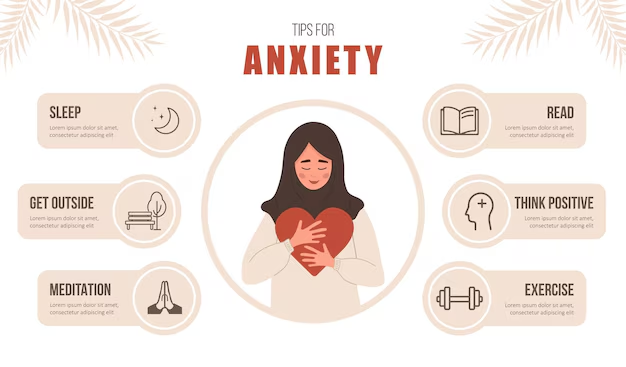
Health anxiety can be overwhelming, but it’s important to remember that it doesn’t define who you are. The mind often creates frightening stories, convincing you something is wrong—even when there’s no real danger. Just because a thought feels urgent doesn’t make it true. With the right approach, healing is possible.
Using proven tips for health anxiety—like mindfulness, cognitive behavioral therapy, and setting boundaries around symptom-checking—can help you regain clarity and peace. Self-compassion is just as important as any coping tool. Remind yourself that you’re doing your best, and that progress takes time and patience.
Start small. Choose just one strategy from this guide and try it today. Even a tiny shift in your daily routine can lead to meaningful change. Healing may not be linear, but every intentional step you take helps you move forward—closer to a calmer, healthier, and more grounded version of yourself.
FAQs
Q1. What is health anxiety ?
Health anxiety is a persistent fear of having a serious illness, despite little or no medical evidence. It often involves excessive symptom checking, worry, and seeking reassurance. Practicing simple tips for health anxiety, like mindfulness and limiting online searches, can help manage these fears.
Q2. What triggers health anxiety ?
Common triggers include past illnesses, witnessing someone else’s health struggles, or reading alarming medical information. Recognizing triggers is one of the first tips for health anxiety to reduce fear and regain control over your thoughts.
Q3. How can I stop Googling my symptoms ?
Set time limits or avoid searching symptoms entirely. Replace the urge with calming activities or journaling. One of the best tips for health anxiety is to trust your healthcare provider, not search engines.
Q4. Can health anxiety be cured ?
Yes, with the right support and strategies. Therapy, especially CBT, and consistent tips for health anxiety like balanced routines and grounding techniques can lead to long-term improvement.
Q5. Should I see a therapist for health anxiety ?
Yes, therapy can be very effective. A mental health professional can guide you through evidence-based tips for health anxiety and help reframe negative thought patterns for lasting relief.

